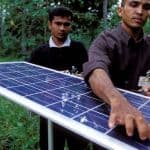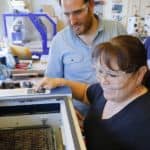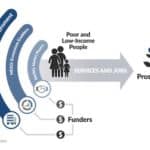The Ben & Jerry of Africa: A Transformation That’s Coming Sooner Than You Think
Somewhere on the continent of Africa are two six year-old children. They are wearing t-shirts and shorts bought from a local seller, which trace back to a donation of used clothes to Goodwill somewhere in the U.S. months earlier. If their parents are earning $3/day or more, these kids are wearing shoes. It’s likely they are not, as their parents would rather pay for school fees and food than shoes.
Neither of these children have ever tasted ice cream. They may not even have dreamed that a treat like ice cream exists. And yet, within 20 years, these two kids will be millionaires, selling ice cream all over the continent. They will be the Ben & Jerry of Africa.
There is no doubt in my mind that this will happen, a few times over by a few pairs of children all over Sub-Saharan Africa. It’s a huge continent with more than a billion residents, half of whom are under the age of 18, who themselves will give birth to yet another billion residents, all of whom will want ice cream.
The Coming Transformation
Most of us who grew up in developed markets don’t realize that 200 years ago, many of our ancestors were just as poor as Africa’s low-income communities today. Over those 200 years, the U.S. and European populations went from 90 percent working as farmers, to 1 percent employed by industrial farms. We electrified our homes and cities, plumbed in running water, banished water-borne diseases through improved sanitation, eliminated diseases like malaria through insecticides, etc. All of this was driven by capitalism, not funded by charity.
The same transformation is coming for the “next billion.” In the last 30 years, China has pulled a half billion people out of poverty. In the last 20 years, India has pulled another half billion. It won’t be long before Africa does the same – and when it does, those 500 million newly minted middle class consumers will want the treats that come with a comfortable income. And a generation of native 20-something entrepreneurs will give it to them.
One of those treats is cold, delicious ice cream – but that is just one. People will also want chicken, fish, goat and other sources of protein; fresh fruits and vegetables; better cookstoves; green fuels for cooking and transport; LED lighting, solar power, sanitation and more. It’s all coming, and coming sooner than everyone imagines.
The one big hurdle keeping this from happening sooner is capital, and this is why I (an American) spend so much of my time investing in and helping African entrepreneurs. I’ve yet to find the ice cream kids, but I’ve found dozens of 20-something and 30-something African entrepreneurs who are busy creating the growth needed to sustain a local Ben and Jerry when they grow up.
The Main Obstacles
The two biggest challenges for these entrepreneurs are business knowledge and funding, both of which are often found in much larger quantities outside of Africa than inside. For those of us living outside, our biggest challenge is finding the great entrepreneurs to invest in and support.
These are the challenges I’ve been tackling for the past half-decade, and from that experience I’d say that while all are difficult, the obstacles facing entrepreneurs are much more of a challenge than those facing outside investors. Though it has required some work, I’ve had the pleasure of working with 25 startups founded by native African entrepreneurs.
I found half of these on sites like 1millionstartups.com, where entrepreneurs create profiles of their companies, and through programs like those offered by the Tony Elumelu Foundation, which puts a spotlight on promising African entrepreneurs. The other half found my Fledge accelerator through word of mouth, articles like this, podcasts, social media and other online marketing.
Once we find them, we invest in them. And more importantly, we invite them to Seattle, Lima or Barcelona for 10-week programs meant to top off their knowledge and connect them to a network of hundreds of Americans, Europeans and Latin Americans who want to help them and their startups. This network connects them further to dozens of investors who are seeking great entrepreneurs with startups ready for funding.
The entrepreneurs we work with have typically bootstrapped their companies, or started them with a $5,000 or $10,000 grant. Most don’t know the first thing about raising money, and we fix that. Some don’t know how to write a business plan – we fix that too. Some have never used a spreadsheet – or if they have, they have never been taught how to build a financial model. We fix that as well, then teach them marketing, sales and other important skills – and there are a lot of skills an entrepreneur needs to know in order to succeed.
A Hidden Challenge
But all of that is not enough, as those business school skills only get entrepreneurs ready to talk to investors. What few of these entrepreneurs know is what to say to get those investors excited. For that, we teach one key skill they don’t teach in business school: storytelling.
It actually helps that all the companies we work with are mission-driven for-profits, not the typical tech-centric companies that get most of the press. We use that mission to help each company craft a TED-like talk rather than a standard investor pitch. We teach the art of storytelling, and the results of those effort make these entrepreneurs stand out – you can see them for yourself online at youtube.com/fledgellc.
The plan is to keep doing this for the next Ben and Jerry – and also for the next Soji, Opio, Nnaemkeka, Ayisha, Alima, etc. in Africa, Latin America, India, Southeast Asia and everywhere else on the planet where social and environmental problems can be fixed by mission-driven for-profit companies. We’ll keep at it until no six year-olds walk the earth without food, clean water or other essentials – and until they all have the pleasure of eating some ice cream.
Luni Libes is a 25+ year serial entrepreneur, (co)founder of six companies.
Photo credit: doppelbelichtung, via Flickr.
- Categories
- Uncategorized



